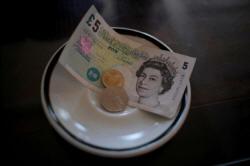|
Sterling sees best week
since March as 'hard Brexit' fears ease
 Send a link to a friend
Send a link to a friend
 [November 04, 2016]
By Yumna Mohamed [November 04, 2016]
By Yumna Mohamed
LONDON
(Reuters) - Sterling traded close to a four-week high on Friday and was
heading for its best week since March, having jumped after England's
High Court put a spanner in the government's plans to forge ahead with
Britain's exit from the European Union.
The battered pound has clawed back 2.5 percent against the dollar this
week <GBP=D4>, with Thursday's court ruling adding to a run of political
and economic developments perceived as positive by investors worrying
over the economic fallout of Brexit.
The pound surged to a four-week high close to $1.25 on Thursday after
the court's decision that the government needed parliamentary approval
to trigger Article 50, which will formally start the process of exiting
the EU. On Friday it remained close to that high at $1.2480.

Investors are hoping that Britain might now be able to avoid an
economically disruptive "hard Brexit", reckoning lawmakers - a majority
of whom supported staying in the EU in June's referendum - will now be
emboldened and will push for Britain to keep access to Europe's single
market.
CMC Markets analyst Michael Hewson said political factors were
dominating, with sterling also benefiting this week from a dollar
weakened by fears that Donald Trump could win the U.S. presidential
election. "I often think markets are a bit like men - they can only
focus on one thing at a time," he said.
"We're seeing a bit of a relief rally now that the worst case scenario
of a unilateral 'hard Brexit' has been deferred, and markets can start
focusing on other factors (like) the U.S. presidential election."
The pound started climbing earlier in the week when Mark Carney said he
would stay as head of the Bank of England for an extra year to help with
a smoother Brexit negotiation process.
[to top of second column] |

An English five pound note and coins are seen at a restaurant in the
British overseas territory of Gibraltar, July 21, 2016. REUTERS/Jon
Nazca/FILE PHOTO

It was further boosted on Thursday by the BoE's decision to scrap its
plans to cut interest rates and raise its forecasts for 2017 growth and
inflation, and also by robust data from Britain's services sector.
But despite this week's rebound, sterling is still 16 percent lower
against the dollar than where it was before June's EU referendum.
Against the euro, it is 14 percent weaker and was trading at 88.90 pence
on Friday.
"We believe that the economy, as well as BoE monetary policy, do not
justify the current sterling weakness, but that politics will remain the
most volatile component in the equation, preventing sterling from a
decent recovery just yet," UBS strategist Constantin Bolz said in a
note.
(Editing by Jemima Kelly and Gareth Jones)
[© 2016 Thomson Reuters. All rights
reserved.] Copyright 2016 Reuters. All rights reserved. This material may not be published,
broadcast, rewritten or redistributed.
 |